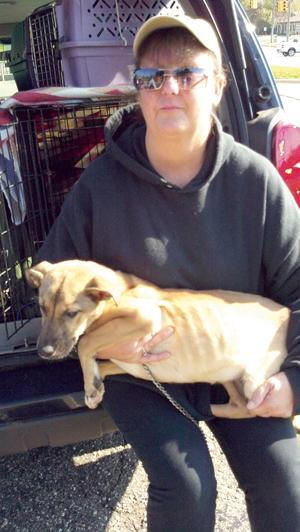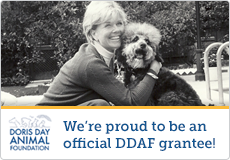
More owners in Pontiac and Inkster unable to care for pets, Animal Care Network says
Published: Sunday, November 13, 2011
By DAVID GROCKI Special to the Oakland Press
 Sadie, an 8-month-old shepherd mix, was found withering away in a Pontiac backyard, emaciated, her ribs poking through her fur. Sadie, an 8-month-old shepherd mix, was found withering away in a Pontiac backyard, emaciated, her ribs poking through her fur.
She was noticed by a volunteer from the Animal Care Network during a neighborhood canvass. The dog’s former owners willingly surrendered her to the network after they were unable to feed the animal due to financial woes.
She is now in care of a foster owner, well-fed and happy, with a new chance at life.
“She’s a really great dog,” said Pam Porteous, manager for the ACN since 1994.
The ACN, a branch of the nonprofit Michigan Animal Adoption Network, is a community service and outreach program that assists low-income pet owners in Pontiac and Inkster with a wide array of services, including vaccination clinics and adoption.
Working off a list the ACN compiles during the week, the teams load vehicles with essential items to provide to families and their pets during routine checks of surrounding neighborhoods.
“Ours is a unique door-to-door street program where we actually hit the streets to find animals in need,” Porteous said.
The volunteers provide doghouses, straw, food and transportation to veterinary clinics for spay and neuter services.
The network also hosts two vaccination clinics each year in Pontiac, assisted by volunteer veterinarians and vet technicians, including roughly 70 other helpers.
In addition, the network has an adoption program that utilizes foster homes for displaced animals, and works with other local animal organizations and shelters.
“The only way to stop animal homelessness and the pet overpopulation is to spay and neuter,” Porteous said, adding that the ACN is a strong advocate for the procedure.
Because of mounting economic hardships throughout the region, the network is receiving a significantly increasing workload.
“More people are moving and leaving their cats and dogs behind, more people are giving up their pets or simply letting them go. Our requests for food and assistance has tripled in the last several years,” Porteous said.
As a consequence of these financial difficulties, the ACN is in dire need of donations.
With the winter months around the corner, the ACN emphasizes the importance of providing assistance to needy animals. The organization passes out literature on dangerous weather, including press releases whenever the weather is expected to be extremely hot or cold. Animals can suffer from hypothermia and frostbite in a manner of minutes and need to be kept indoors during severe weather, Porteous said.
The ACN’s street teams generally consists of 20 volunteers who communicate with neighborhood pet owners about humane and proper pet care. Those interested in volunteering services may apply, but Porteous has a word of caution for those considering the prospect.
“This program is not your everyday normal volunteer program and is very difficult for people to handle. It is very upsetting, and we experience many, many bad and sad situations. Most of the animals live outside, many are sick or injured, or on heavy chains. This is a very difficult program … (the volunteers) have to be very experienced with animals.”
However, volunteering for the ACN does have its virtues.
“Our rewards are always wagging tails and hugs. It is most rewarding when we rescue a dog or cat from a horrible situation and are able to get the animal into a great adoption program or a good permanent home,” Porteous said.
FYI
Visit the Animal Care Network’s website at www.mi-ann.org for more information on donating or volunteering services. Tips, concerns or pet-assistance requests can be made by calling 248-545-5055.
|






